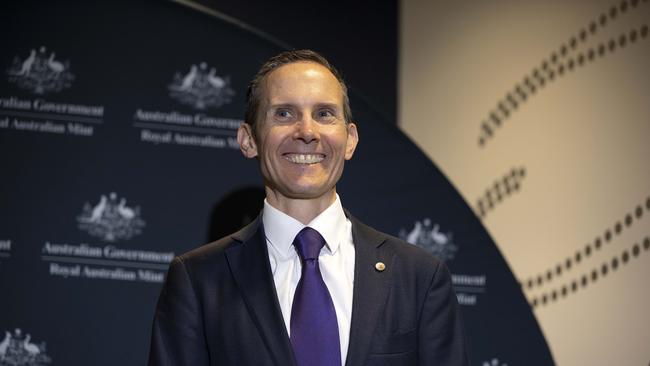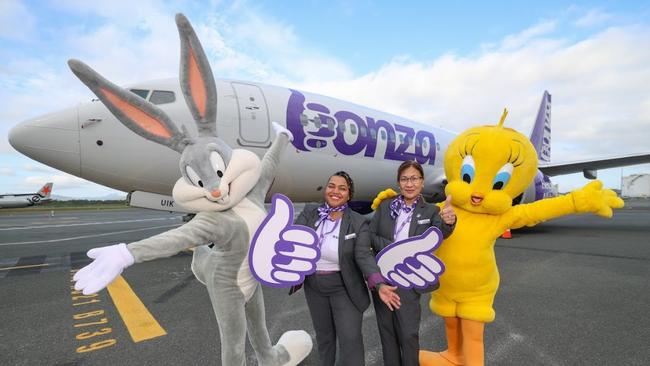Assistant Minister Andrew Leigh says Qantas has little competition for premium business travellers
Competition Minister Andrew Leigh says that Qantas has faced little competition since Virgin Australia went into administration and that merger reform could avert this trend.
Business
Don't miss out on the headlines from Business. Followed categories will be added to My News.
Qantas has faced little competition since Virgin Australia entered into voluntary administration in 2020, according to government minister Andrew Leigh, who says revamped competition laws being introduced will result in lower prices and cost-of-living relief for householdsacross a range of industries.
The Assistant Minister for Competition, Charities and Treasury said fewer disruptive forces were resulting in consumers paying higher airfares, and that airlines were no longer competing head to head but instead carving out specialties.
He said aviation was one of several sectors that had fewer price disrupters and innovators than in past decades, and many had merged with the larger incumbents, which he hoped would change under revamped merger reform legislation.
“The Australian government wants to make sure Australia’s merger rules and competition policy are in the best interests of consumers. That means enabling beneficial mergers while preventing or mitigating those that would substantially harm competition,” Mr Leigh told a Melbourne business summit.
Planned merger reforms announced by the government would require companies above a certain size to gain formal approval from the Australian Competition and Consumer Commission before pursuing any deals, along with a special “call-in” power to capture smaller mergers that raise specific competition concerns.
“The competition landscape of the aviation industry has changed significantly since the pandemic. Airlines are no longer competing head to head, but instead largely focusing on market niches,” Mr Leigh said.

“While Virgin Australia has re-emerged under private equity ownership in late 2020, its strategy now focuses on value-conscious travellers, which means that Qantas faces less direct competition in the premium corporate consumer segment.”
Mr Leigh said that for meaningful competition in the sector, smaller airlines such as Rex and Bonza would need to grow significantly.
Australia’s aviation sector has had a history of market disrupters, including Compass Airlines in the 1990s and Virgin Blue rapidly filling the void left by Ansett – which in turn prompted Qantas to launch Jetstar. Mr Leigh said this had resulted in better service and prices for travellers.
“Compass ran into problems getting access to airport slots and delays in aircraft delivery while facing strong competition from Qantas and Ansett,” Mr Leigh said.
“Virgin Blue moved away from a low-cost business model by opening airport lounges in 2003 and launching a frequent flyer program in 2005 … to compete more directly with Qantas, particularly for business travellers, and appeal to a broader market.”
Calls for greater competition come in the face of the government’s controversial decision to not award Qatar Airways the right to operate 21 more flights into the largest ports of Sydney, Melbourne, Brisbane and Perth.
Adding to the uproar was mixed messaging as to why Transport Minister Catherine King blocked the request, including the need to protect Qantas’s profit, human rights issues and not being in the national interest.
“The decision maker was Catherine King in that instance. She made clear that decision was based on national interests. And we would welcome Qatar flying into airports,” said Mr Leigh, who wanted Qatar to fly into smaller airports such as Canberra.

He said that the new Western Sydney Airport would create more competition in the market when it opened in 2026 because it would not be subjected to a flight curfew.
“Competition encourages productivity gains that can be passed through to consumers for lower prices, more choice of higher quality products and it helps workers gain higher wages,” Mr Leigh said.
Meanwhile, AGL chief financial officer Gary Brown said at the same conference that more Australians purchasing an electric vehicle would contribute to the doubling of demand for electricity between now and 2050.
Mr Brown said an electric vehicle charger resulted in a 30 per cent increase in consumption for the typical home. “There’s no question that electrification is going to drive an enormous increase in demand going forward,” he said.
AGL plans to completely exit coal by 2035 as part of the country’s move to alternative renewable energy sources such as solar and wind, although Mr Brown said it would be a “challenging” transition.
“We do expect that the transition will be volatile and it will be challenging. So it’s really important that we increase the availability factor of those assets from roughly 76 per cent today up to 88 per cent by 2027, so that ultimately when those assets are called upon, they’re ready to go,” he said.
Originally published as Assistant Minister Andrew Leigh says Qantas has little competition for premium business travellers



